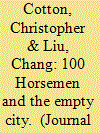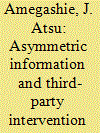| Srl | Item |
| 1 |
ID:
103720


|
|
|
|
|
| Publication |
2011.
|
| Summary/Abstract |
We present game theoretic models of two of the most famous military bluffs from history. These include the legend of Li Guang and his 100 horsemen (144 BC), and the legend of Zhuge Liang and the Empty City (228 AD). In both legends, the military commander faces a much stronger opposing army, but instead of ordering his men to retreat, he orders them to act in a manner consistent with baiting the enemy into an ambush. The stronger opposing army, uncertain whether it is facing a weak opponent or an ambush, then decides to flee and avoid battle. Military scholars refer to both stories to illustrate the importance of deception in warfare, often highlighting the creativity of the generals' strategies. We model both situations as signaling games in which the opponent is uncertain whether the general is weak (i.e. has few soldiers) or strong (i.e. has a larger army waiting to ambush his opponent if they engage in combat). We then derive the unique Perfect Bayesian Equilibrium of the games. When the probability of a weak general is high enough, the equilibrium involves mixed strategies, with weak generals sometimes fleeing and sometimes bluffing about their strength. The equilibrium always involves the generals and their opponents acting as they did in the historical examples with at least a positive probability. When the probability of a weak general is lower (which is reasonable given the reputations of Li Guang and Zhuge Liang), then the unique equilibrium always involves bluffing by the general and retreat by his opponent.
|
|
|
|
|
|
|
|
|
|
|
|
|
|
|
|
| 2 |
ID:
130405


|
|
|
|
|
| Publication |
2014.
|
| Summary/Abstract |
I study a two-period model of conflict with two combatants and a third party who is an ally of one of the combatants. The third party is fully informed about the type of her ally but not about the type of her ally's enemy. In a signaling game, I find that if the third party is unable to give a sufficiently high assistance to her ally, then there exists a unique separating equilibrium in which the third party's expected intervention causes her ally's enemy to exert more effort than in the absence of third-party intervention; this worsens the conflict.
|
|
|
|
|
|
|
|
|
|
|
|
|
|
|
|